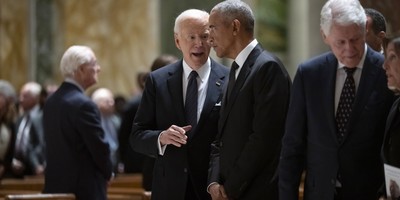The barbaric terrorist attacks in Brussels were a clear reminder of the growing threat of Islamic extremism. This vicious ideology continues to take new forms - once al-Qaeda, now ISIS, both with the shared goal of creating an “Islamic state" capable of enforcing Sharia law and undermining the achievements of the civilized world.
While the Sunni version of fundamentalism desperately seeks to achieve this objective, the Shiite version in Tehran has been in place for nearly four decades. It should be confronted, not appeased.
Syria, Iraq, and Yemen have become breeding grounds for ISIS, a blessing in disguise for Tehran because it conveniently justifies the mullahs’ extraterritorial maleficence.
Some in the West continue to pin their hopes on elusive “reforms” within the clerical establishment, despite the fact that the Iranian regime’s regional agenda is, in the words of its Supreme Leader Ali Khamenei, “diametrically opposed” to that of the international community. Their optimism is fueled by the misguided expectation of political reform in the aftermath of the nuclear deal. Neither the facts nor the evidence support this contention.
Rather than changing course, Tehran is ever more adamant that others should follow its destructive regional policies. It recently conducted several missile tests in brazen defiance of UN Security Council resolutions. And if improved human rights are a sign of moderation, the situation has gotten much worse under supposedly “moderate” president Hassan Rouhani.
Just this month, an independent United Nations human rights expert voiced serious concerns about the “extremely high rate of executions” in Iran, “especially for juvenile offenders.” The human rights organization Amnesty International has called Iran one of the last remaining executioners of children in the world. That is hardly a sign of reform.
Recommended
In addition, women continue to be treated as second-class citizens. Last year, dozens were victims of acid attacks by government-organized thugs for violating the regime’s strict veiling laws.
The fact is the Iranian regime is controlled by an unelected cleric - equivalent to the "caliph" in the fabled "caliphate"- accountable to no one.
A few days after the signing of the Joint Comprehensive Plan of Action (JCPOA) last year, Khamenei warned, “We will never stop supporting our friends in the region and the people of Palestine, Yemen, Syria, Iraq, Bahrain and Lebanon. Even after this deal our policy towards the arrogant U.S. will not change.”
He reiterated this radically anti-U.S. position in his Nowruz remarks on March 20. The eighty-five-minute address focused on the complexity of Western, and especially American, animosity against Iran, casting the United States as Iran's "enemy par excellence." He characterized recent post-deal rhetoric as a U.S. plot to inject the idea of political change into the minds of Iranians and the elite,and criticized Iran's nuclear negotiating team for violating some of his redlines.
The attacks in Brussels this week should send a message to western capitals that the Iranian regime’s funding of terrorism and extremism will continue to threaten and destabilize the Middle East region and the world. The ruling theocracy cannot be reformed, because any retreat from its current policies would inevitably loosen its grip on power and open the door to fundamental change.
Many observers agree that the real hope for reform lies within the larger Iranian society and the ranks of the real opposition, and not within the shrinking confines of a decaying theocracy.
The curtain of communism finally fell in Eastern Europe when pulled down by that region’s restive population; so can the curtain of fundamentalism in Iran.
The international community and U.S. government, for that matter, can only solve the Iranian problem by focusing on the problem itself – the regime. Otherwise, efforts to instigate genuine change will fail. Removing Assad from power, and thus ending the Iranian regime’s involvement in Syria, would be a good starting point. It would also stop ISIS in its tracks.
Ultimately, the answer to Islamic extremism lies in the hands of the people, specifically the Iranian people and their organized opposition, who should be supported in earnest. The removal of the epicenter of fundamentalism in Iran will go a long way toward ensuring that the world is free of the vile threat of extremism.

























Join the conversation as a VIP Member